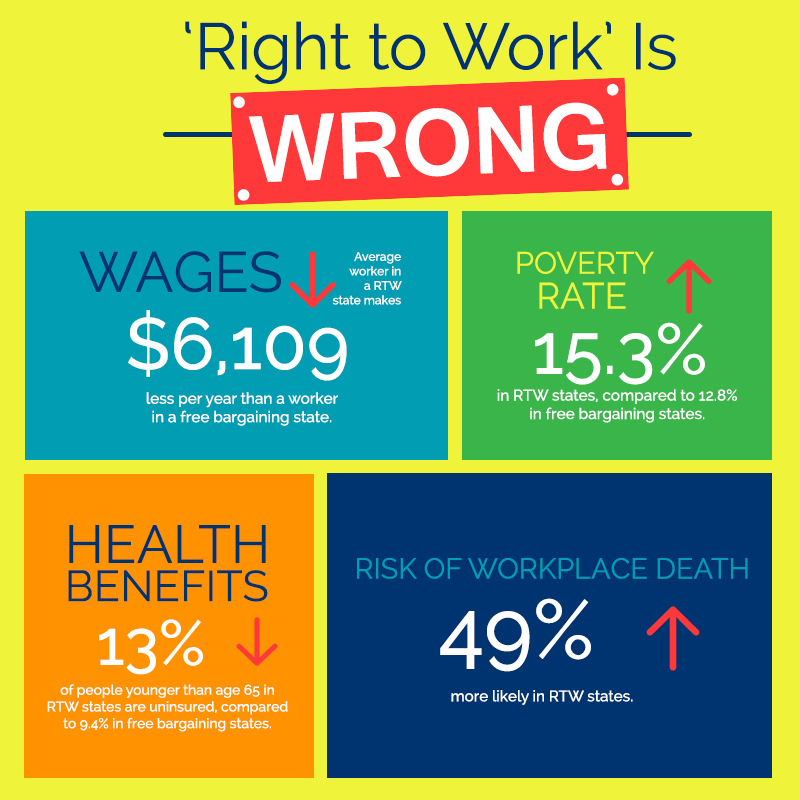https://maas.construction/increasing-the-property-value-of-spokane-homes-with-basement-remodeling
Realistically Speaking Boca
Tuesday, April 14, 2020
Increasing the Property Value of Spokane Homes with Basement Remodeling
Skilled Construction Professionals Save Spokane Homeowners Money
https://maas.construction/skilled-construction-professionals-save-spokane-homeowners-money
Bringing Your Spokane Home Addition Vision to Life
https://maas.construction/bringing-your-spokane-home-addition-vision-to-life
Against Right to Work Laws
Proponents of right-to-work laws defend them on several grounds:
The laws lower wage costs, and thus consumer prices.
The laws benefit workers in non-unionized workplaces, who will earn less in their absence.
The laws give particular workers opportunities to negotiate for better, or different, terms of employment.
States with “Right-to-Work” Laws Have Lower Wages and Incomes
On average, workers in states with right to work laws make $6,109 a year (12.1%) less annually than workers in other states ($44,401, compared with $50,511).1
Median household income in states with these laws is $8,174 (13.9%) less than in other states ($50,712 vs. $58,886).2
29.6 percent of jobs in right to work states were in low-wage occupations, compared with 22.8% of jobs in other states.3
States with “Right-to-Work” Laws Have Higher Workplace Fatality Rates
“Right-to-Work” makes workplaces more dangerous. According to data from the Bureau of Labor Statistics, the rate of workplace deaths is 54% higher in right-to-work states.4
1 Bureau of Labor Statistics, Quarterly Census of Employment and Wages (all industries, all establishments, average annual pay), 2014 data. Numbers are rounded ($50,510.58 and $44,401.17).
2 U.S. Census Bureau, Table H-8. Median Household Income by State: 1984 to 2014.
3 CFED, Asset and Opportunity Scorecard, Low Wage Jobs, 2013.
4 Bureau of Labor Statistics, National Census of Fatal Occupational Injuries in 2014.

https://aflcio.org/issues/right-work
water damage parkland
fire damage coral springs
For Right to Work Laws
Why Support Right to Work Laws
It can lower school taxes which is good for the average American earner.
Another benefit pointed out by proponents is again related to unions. They maintain that with the adoption of this law, there will be lesser teacher unions as is evident in the states that have already have RTW. Consequently, there will be lower school taxes. And since these taxes are taken from property taxes, home owners will have to pay lesser property taxes as opposed to homeowners living in states with no Right-to-Work laws. People who are for RTW say teachers’ unions are responsible for the increase in education costs.
It gives employees the freedom to choose if they want to join a union or not.
Supporters of this law assert that employees have the right to decide for themselves if they are to become union members or not. The Right-to-Work makes this possible. Saying that this law mandates employees not to join labor unions is misconstrued. Instead, it gives workers the free will to act on their own and in effect encouraging unions to work on enticing employees to sign up for membership. For proponents, this is better than forcing individuals to join against their will. This is a great way to ensure labor unions will negotiate better with employers on working conditions, higher wages and equality in the workplace and act in the best interest of members to keep the organization alive.
It minimizes corruption.
Advocates for RTW say that some unions monopolize particular sectors in some unions, thus affecting certain industry sectors. Also, a big part of the collected dues from members are given to politicians for endorsements and in return they give their support to the unions and not necessarily the members benefiting from this. In the states with RTW laws, this occurrence will be reduced since employees will not be forced to pay dues they don’t agree to. Lesser union members mean lesser dues collected. In the end, politicians will not have a reason to favor selected unions just so they can get election money.
Unions become accountable.
One thing RTW does is weaken the power of unions to dictate on employees and coerce them to join. In reality, unions are money-making businesses. They collect dues from members which can be too much. Moreover, as members, these employees cannot negotiate on their own nor can they let another labor union support them. This can lead to union monopoly. RTW guarantees this is not going to happen. With this law, employees have the right to voluntary be a member and quit if they are unhappy with how the union works. This way, unions will be more pro-employees and genuine with providing their services to members. (Source http://connectusfund.org/7-strongest-pros-and-cons-of-right-to-work)
Missouri Group Raises 1.3 Million to Fight Right to Work Law
The right-to-work legislation signed by Missouri Gov. Eric Greitens in 2017 prohibits unions from making workers have to pay dues while employed. The law stops this condition.
Greitens made an appearance as a speaker at the 65th annual Governor’s Ham Breakfast at the Missouri State Fair on Thursday. Greitens discussed a number of issues including recent violence in Charlottesville, Virginia.
He spent the last few minutes of his time talking about right-to-work. He said businesses around the United States and across the globe have taken notice that Missouri is “open for business again.”
The governor’s comments came on the eve of a right-to-work protest planned for Friday morning in Jefferson City. The rally is scheduled for 10 a.m., and protestors will be rallying to repeal the legislation. (Source: http://www.abc17news.com/news/governor-praises-right-to-work-before-protestors-gather-in-jefferson-city/606192498)
https://righttoworkstates.org/missouri-group-raises-1-3-million-to-fight-right-to-work-law/
